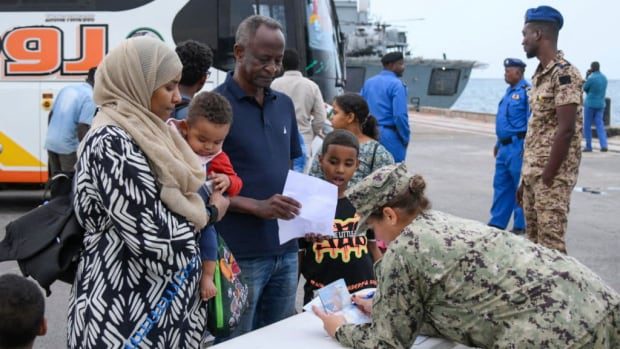Global Courant 2023-05-01 23:37:24
The United Nations warned on Monday that 800,000 people could flee Sudan as rival military factions battled in the capital despite a perceived ceasefire and foreign states scaled down evacuations.
Hundreds of people have been killed and thousands injured in 16 days of fighting since disputes between the Sudanese army and the paramilitary Rapid Support Forces (RSF) erupted into conflict on April 15.
There appears to be little prospect of a quick resolution to the crisis, which has damaged large parts of the capital Khartoum, risked drawing regional powers in and reignited conflict in the Darfur region.
Both warring sides agreed on Sunday to extend a much-violated ceasefire by 72 hours. But airstrikes and artillery rang out on Monday as smoke hung over Khartoum and neighboring towns.
Smoke billows over buildings in Khartoum on Monday, with deadly clashes between forces of rival generals now in their third week. (AFP/Getty Images)
UN Deputy Chief for Refugees Raouf Mazou said his agency was preparing an exodus of 815,000 people, including 580,000 Sudanese and foreign refugees now living in the country. Some 73,000 have already left Sudan, he said.
Abdou Dieng, the UN humanitarian coordinator in Sudan, warned on Monday that the country’s humanitarian crisis is turning into a “complete catastrophe”. He said civilians sought refuge in parts of Sudan less affected by fighting or fled to neighboring countries, increasing the risk of a “regional spillover effect of the crisis”.
The top UN official in Sudan, Volker Perthes, also warned of a “major humanitarian crisis” as people in Khartoum ran out of food and fresh water and fighting damaged water systems.
A family sits on a bus as passengers fleeing Sudan arrive at Egypt’s Argeen land crossing on April 28 after being evacuated from Sudan’s capital, Khartoum. (Mohamed Abd El Ghany/Reuters)
Jamila, a woman who is still in Khartoum with her family, only eats one meal a day because there is so little to eat. RSF troops are stationed in front of their home and refuse to leave. “The sound of fighting is in our ears all day long,” she said.
Egypt said 40,000 Sudanese have crossed the border, while others have gone to Chad, South Sudan and Ethiopia, or traveled across the Red Sea in evacuation boats.
Some displaced Sudanese congregate in hubs like Atbara, northeast of Khartoum, as they work out plans or make their way to the Egypt-Chad border.
More than 70,000 South Sudanese refugees living in Khartoum have fled to the country’s neighboring White Nile province, settling in already overcrowded camps, said Mustafa Amr Abarou, a spokesman for the Sudanese refugee agency.
At least 10 trucks a day carrying people fleeing Khartoum continue to arrive, straining the agency’s capabilities, he said. Sudan is hosting more than 1.3 million refugees, including 800,000 from South Sudan, according to UN figures.
Sudanese venturing into the streets at home have described scenes of desolation.
Here’s a photo taken Sunday of the center of Atbara, a northern Sudanese city where thousands of people have moved after fleeing war in the capital, Khartoum. (Khalid Abdelaziz/Reuters)
“We saw dead bodies. The industrial area all looted. We saw people carrying TVs on their backs and looting big sacks from factories,” said Mohamed Ezzeldin, a resident of Khartoum.
Many fear for their lives in the power struggle between the army chief and the head of the RSF, who shared the government after a coup in 2021, but fell out over a planned transition to civilian rule.
According to the Ministry of Health, at least 528 people were killed and 4,599 injured. The United Nations has reported a similar number of deaths, but believes the true number is much higher.
LOOK | Canada halts airlifts from Sudan:
Breaking down the Sudan conflict and who is fueling the fight
Sudan’s capital has turned into a war zone as two rival factions vie for control, but other countries are also at play. McGill Associate Professor Khalid Medani and War Child Canada President Samantha Nutt explain how outside forces are also helping to fuel the struggle.
Over the past week, foreign governments have withdrawn their citizens in a series of air, sea and land operations, though several countries have halted their efforts.
Those who remain face hardship and danger.
“I come to work for two or three hours and then I close because it’s not safe,” said Abdelbagi, a hairdresser in Khartoum who said he had to keep working because prices were rising.
Hospitals under attack
Many hospitals in the capital remained out of order or inaccessible due to the fighting, while others are occupied by the warring factions, especially the RSF, said Atiya Abdalla Atiya, secretary of the Sudanese doctors’ syndicate, which monitors civilian casualties.
More than two-thirds of hospitals in areas of active combat are said to be out of service, with fighters looting dwindling supplies.
The UN and other aid agencies have suspended services, though the World Food Program said on Monday it was resuming operations in safer areas after personnel died early in the war.
US soldiers escort Americans to a US Navy ship in Port Sudan on Sunday. (Smowal Abdalla/The Associated Press)
The UN fears the impact of the war on both Sudan and the wider region, said Martin Griffiths, a senior humanitarian and relief official, warning that the country was at a “breaking point”.
“The scale and speed of what is happening in Sudan is unprecedented,” said Griffiths, who will visit Sudan on Tuesday. Agencies import supplies through Port Sudan, but need security guarantees to get them to Khartoum.
Ceasefire violations continue
Both sides said on Monday they were making progress without directly commenting on ceasefire violations.
Talks about a long-term ceasefire could take place in both Saudi Arabia and South Sudan, Perthes said from Port Sudan. He said the former logistics may be easier, though both sides need safe passage through each other’s territory. “That is very difficult in a situation where there is a lack of confidence,” he said.
LOOK | Breaking down the Sudan conflict and who is fueling it:
Canada halts airlifts from Sudan
Canada has suspended its evacuation operation at a Khartoum airport after a ceasefire unraveled and violence escalated, but Canadians are still stranded in Sudan and options for escape are limited.
The army said it had cut RSF’s combat effectiveness by half and stopped trying to reinforce its positions in the capital. The RSF said it still controls key Khartoum sites and is itself beating back army reinforcements.
News agencies were unable to verify the claims made by either side.








